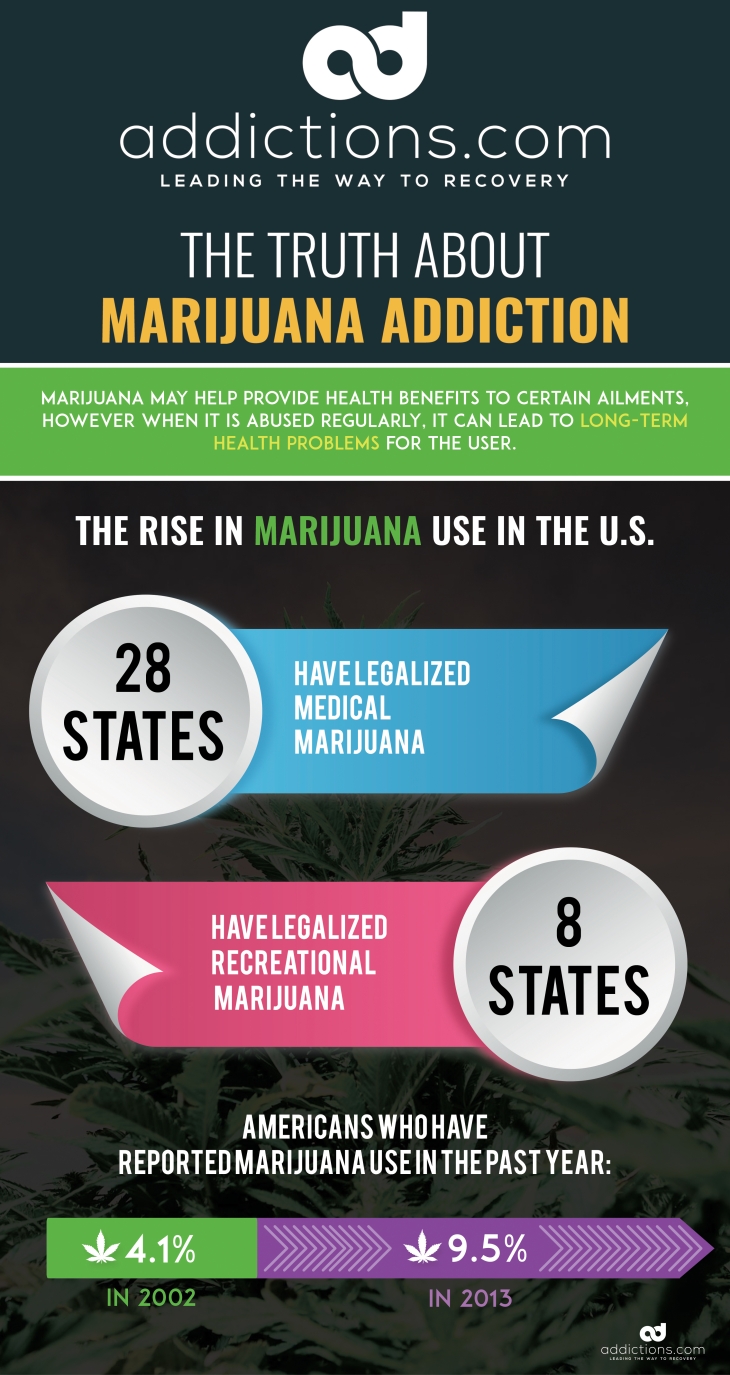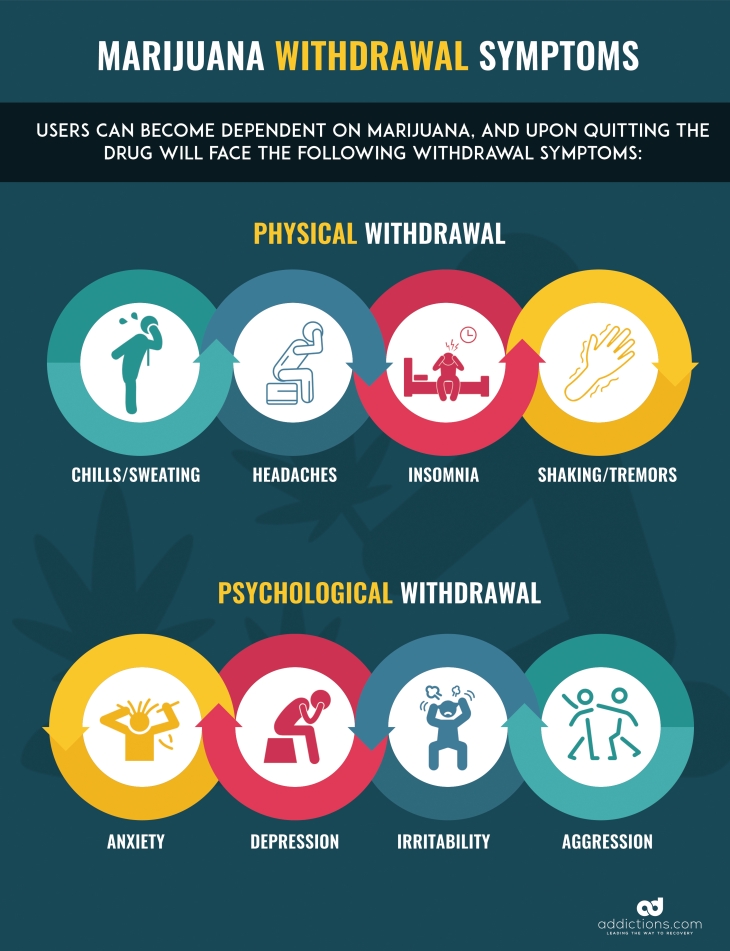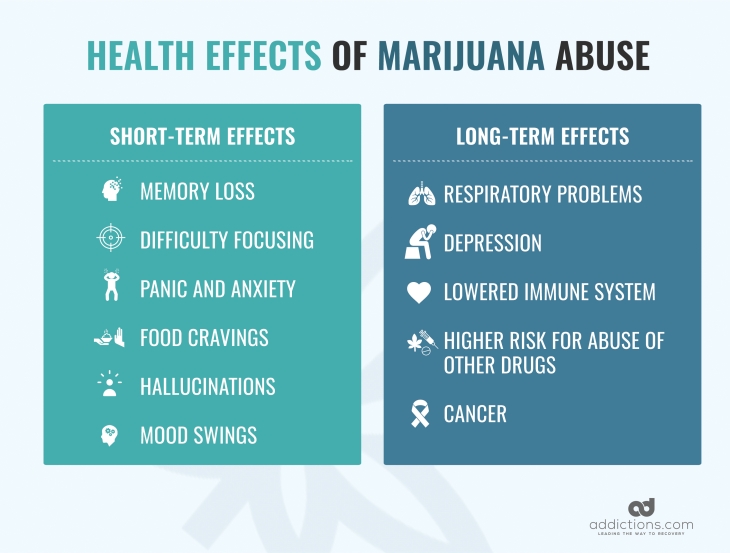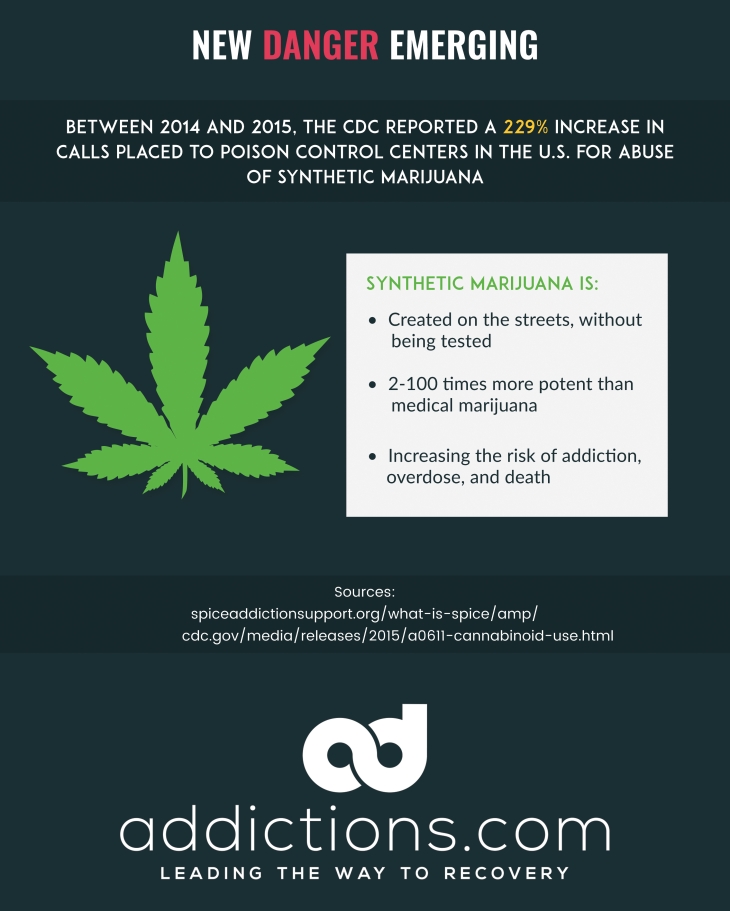There is much controversy surrounding whether marijuana is truly addictive — especially now that the substance is legal in many parts of the United States. The legalization of medical and recreational marijuana has led to an increase in its use throughout the U.S. — making marijuana the most commonly used illicit drug in the country. While marijuana is legal and may offer health benefits for some, abusing the drug can lead to addiction just like alcohol, prescription drugs, and other legal substances.
When abused, marijuana has negative effects on the brain and body that can last a lifetime, and impair your overall quality of life. Marijuana abuse can eventually turn into marijuana addiction, and cause problems with your finances, education, family, and more.
Here’s everything you need to know about marijuana abuse, and about what you can do to prevent marijuana addiction so you and your family can remain healthy and safe.
The Rise in Marijuana Use Across the U.S.
Medical marijuana is now legal in 28 states, while recreational marijuana is legal in eight states. Marijuana use and abuse is rising at a significantly faster pace in states that have legalized the drug, according to a study published in JAMA Psychiatry. In 2002, only 4.1 percent of Americans had reported using marijuana within the last year, but in 2013, this number jumped to 9.5 percent.
Marijuana use rates are highest in Colorado, Oregon, Vermont, and Alaska. Roughly 21.6 percent of people in Colorado report using marijuana in the past year, while Oregon ranks second with a reported 19.9 percent. Vermont trails closely behind Oregon at 19.8 percent, followed by Alaska with 19.5 percent of residents using the drug.
Here’s where marijuana is legalized for recreational and medicinal use in the U.S.
- Alaska
- California
- Colorado
- Maine
- Massachusetts
- Nevada
- Oregon
- Washington
Now that marijuana has become easier to obtain for medical and recreational use, more and more Americans are beginning to experiment with this substance. However, many remain unaware of the dangers surrounding marijuana abuse, and about how this substance can interfere with one’s health and quality of life.
Is Marijuana Physically or Psychologically Addictive?
For many years, there was little scientific evidence surrounding whether marijuana was harmful, or whether the drug was physically or psychologically addictive. Now that marijuana is gradually being legalized across the U.S., more studies are beginning to emerge on the effects this substance has on the body and brain. Many argue that marijuana is not addictive and offers a low potential for abuse, while others say that when abused, marijuana affects the body and brain much like alcohol, prescription drugs, and illicit substances like heroin, cocaine, and hallucinogens.
The active ingredient in marijuana is tetrahydrocannabinol, or THC — a chemical compound that binds with cannabinoid receptors in the brain to produce euphoria and psychoactive effects. THC activates the brain’s reward system and increases production of a neurotransmitter called dopamine, which is responsible for controlling feelings of pleasure and reward such as that produced by sex, eating, drugs, and alcohol. Those who enjoy the euphoric highs of marijuana on behalf of increased dopamine levels are at greater risk for abuse and addiction, as they may frequently return to using the drug to experience its effects.
Given the way marijuana interferes with brain chemistry, does that mean the drug is physically and psychologically addictive? The answer is yes. Those who abuse marijuana for an extended period of time often have difficulty producing dopamine on their own naturally, and physically rely on marijuana for dopamine release.
Those who are physically dependent on marijuana will suffer withdrawal symptoms upon quitting the drug or reducing use. Common physical withdrawal symptoms of marijuana include:
- Restlessness
- Chills
- Sweating
- Headaches
- Insomnia
- Shaking / tremors
- Abdominal cramps
Marijuana is also psychologically addictive due to the way dopamine affects one’s mood and upsets the natural balance of other mood-regulating neurotransmitters. Serotonin, acetylcholine, and GABA are other brain chemicals commonly affected by marijuana abuse and increased dopamine levels. Common psychological withdrawal symptoms of marijuana include:
- Anxiety
- Depression
- Irritability
- Aggression
Understanding Medical Marijuana and Its Uses
In addition to THC, marijuana contains another chemical compound called cannabidiol, or CBD — a non-psychoactive compound that produces feelings of pain relief and relaxation. CBD binds to cannabinoid receptors in the brain in the same manner as THC, and offers therapeutic effects for those who suffer certain health conditions. Many medical marijuana strains are high in CBD to provide relief for patients who have prescriptions.
Medical marijuana is generally prescribed to treat the following:
- Chronic pain
- Muscle spasms, such as that caused by multiple sclerosis
- Epilepsy
- Concussion or traumatic brain injury
- Poor appetite or weight loss caused by chronic illness or nerve pain
- Bipolar disorder
- Short-term sleep disorders associated with pain and illness
- Nausea and vomiting caused by chemotherapy in cancer patients
- Alzheimer’s disease
- Crohn’s disease
Since marijuana remains illegal on a federal level, medical marijuana is not regulated or approved by the FDA. Medical marijuana is tested for safety in most states to lower the risk for adverse health consequences. For instance, cannabis testing regulations in Colorado require that all medical marijuana be tested for THC and CBD potency, and screened for harmful toxins including pesticides, mold, and bacteria. However, states including Arizona, Michigan, Montana, Rhode Island, and the District of Columbia do not require state-mandated testing for medical marijuana — which can result in life-threatening consequences for patients and the risk for fatal health problems down the road
Signs and Symptoms of Marijuana Addiction
Though marijuana does offer therapeutic benefits for some, the risk for addiction is high when the drug is misused. Signs and symptoms of marijuana abuse are physical and psychological, and can be easy to spot when you know what to look for.
Common marijuana addiction symptoms:
- Tolerance. Those suffering from marijuana abuse may become tolerant to the drug, and start using higher amounts in an effort to achieve the drug’s effects.
- Physical dependence. Those become tolerant to marijuana are at high risk for becoming physically dependent on the drug. Physical dependence on marijuana is normally characterized by withdrawal symptoms when quitting or reducing use.
- Loss of control over use. Those who experience problems quitting or reducing marijuana use and who keep returning to the drug after promising to stop may be addicted.
- Prioritizing marijuana use over other important obligations. Those who suffer from addiction often devote less time to family, work, and favorite hobbies, and more time to obtaining, using, and recovering from marijuana use.
- Needing marijuana to relax or feel “normal.” One who feels they need marijuana in an effort to achieve relaxation or to feel more like themselves may be addicted to the drug.
- Abusing marijuana despite negative consequences. Those who suffer from marijuana addiction will continue abusing the drug despite known consequences such as missing work or getting into trouble with the law.
- Using marijuana to cope with stress and mental health disorders. Many who struggle with marijuana addiction will use the substance to self-medicate for conditions such as depression, anxiety, and PTSD.
Marijuana abuse and addiction increases one’s risk for serious health problems, as well as major life problems involving the law, finances, family relationships, career, and education.
Short- and Long-Term Health Effects of Marijuana Use
When used in moderation or for therapeutic reasons, marijuana generally produces feelings of relaxation, pain relief, and euphoria. But when abused, marijuana causes a number of short- and long-term effects that can lead to worsened health and impaired quality of life. THC generally moves quickly from the lungs into the bloodstream, and can start producing effects within minutes or up to an hour.
Short-term effects of marijuana use include:
- Poor memory / short-term memory problems
- Poor muscle coordination
- Lowered reaction time
- Difficulty with thinking and problem-solving
- Short attention span
- Panic
- Increased appetite / food cravings
- Altered sense of time and space
- Anxiety and paranoia
- Hallucinations
- Sexual dysfunction
- Changes in mood
- Increased heart rate
Long-term marijuana use offers consequences that are much more serious — most notably, cognitive decline. Research shows that marijuana affects brain development, and can permanently lead to problems with thinking, memory, and learning functions. One study in particular conducted in part by researchers at Duke University found that long-term marijuana use can cause a decline in IQ by as much as eight points if an adult started using the drug during their teens years.
Long-term effects of marijuana use include:
- Respiratory problems
- Temporary hallucinations
- Temporary paranoia
- Addiction
- Higher risk for abuse of other drugs — particularly opioids
- Depression
- Anxiety
- Worsening symptoms in those with schizophrenia
- Low baby birth weight when used during pregnancy
- Problems when prenatal development
- Poor immune system function
- Cancer
- Fertility problems
The most effective way to reduce the risk for long-term health problems caused by marijuana abuse is to seek marijuana addiction treatment. Marijuana addiction treatment helps individuals overcome physical and psychological dependency on the drug so they can return to living healthier, more fulfilling lives without the risk for physical and psychological health problems.
Dangers Surrounding Synthetic and Street Marijuana
While marijuana is generally derived from the cannabis plant, there are strains of marijuana available on the streets that are dangerous and unnatural, and can significantly increase one’s risk for addiction, overdose, and death. This type of marijuana is known as synthetic marijuana, and is commonly sold under street names K2 and Spice . Synthetic marijuana is usually a mixture of non-cannabis herbs and plants such as oregano that have been sprayed with dangerous, mind-altering chemicals like embalming fluid.
Synthetic marijuana binds to the same cannabinoid receptors as THC and CBD, but is usually between two and 100 times more potent, and causes severe side effects.
Common side effects of synthetic marijuana:
- Vomiting
- Vision blackouts
- Increased heart rate
- High blood pressure
- Headaches
- Chest pain
- Agitation
- Psychosis
- Kidney damage
Synthetic marijuana is made in China and other Pacific Rim countries, and sent to the U.S. for distribution on the streets. In April 2015, a dangerous batch of synthetic pot led to the hospitalization of 160 people in New York within one week, and caused one overdose death in Virginia. Synthetic and street marijuana in the U.S. is often laced with potent deadly substances such as codeine, PCP, and fentanyl — driving the risk for addiction and overdose even higher.
Benefits of Marijuana Addiction Treatment
Seeking treatment for marijuana addiction allows you to improve your overall health and take back control of your life. The physical aspect of marijuana addiction is treated using detoxification, which helps you withdraw from marijuana safely with a lowered risk for adverse health complications. The psychological aspect of marijuana addiction is commonly treated using counseling, 12-step support group therapy, and behavioral therapies that address the root cause of your addiction.
Here are benefits associated with marijuana addiction treatment:
- No more drug cravings. Detox helps you overcome physical dependency on marijuana so you no longer crave the drug physically, while counseling teaches you how to manage cravings using healthier coping strategies.
- Avoid withdrawal symptoms. Many drug rehab centers perform marijuana detox using medications that reduce or eliminate some or all withdrawal symptoms.
- Improved cognitive function. Overcoming marijuana addiction allows your brain and memory to naturally repair itself over time without exposure to the drug — improving overall cognitive function.
- Enhanced lifestyle. Marijuana addiction can be time-consuming, but many drug rehab centers help you discover new hobbies and interests that replace marijuana use.
- Repair and rebuild relationships. Marijuana addiction can put strain on relationships with friends, family, and romantic partners, but many treatment centers offer family therapy so you can mend these relationships.
- Improved health. Short-term effects of marijuana use such as increased heart rate can lead to stroke or heart attack, while long-term use increases the risk for lung failure, cancer, and other fatal diseases. Seeking marijuana addiction treatment lowers your risk for these health problems.
- Overcome co-occurring disorders. Many drug rehab centers also offer behavioral therapies for co-occurring mental health disorders like OCD and PTSD that may have triggered marijuana addiction in the first place.
Aside from detox, the most commonly used treatments for marijuana addiction are cognitive-behavioral therapy, contingency management, and motivational enhancement therapy. At this time, there are no FDA-approved medications used to treat physical dependence on marijuana, but sleep aids and anti-seizure medications are often prescribed to treat insomnia and other sleep disorders that may occur during withdrawal.





